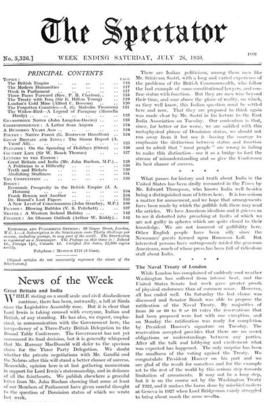The Naval Treaty of London While London has complained of
suddenly cool weather Washington has suffered front intense heat, and the United States Senate last week gave greater proofs of physical endurance than of common sense. However, all has ended well. On Saturday the last clause was discussed and Senator Borah was able to propose the ratification of the Naval Treaty. By majorities of from 50 or 60 to 9 or 10 votes the reservations that had been proposed were lost with one exception, and on Monday the ratification was ready for completion by President Hoover's signature on Tuesday. The reservation accepted provides that there are no secret obligations or understandings between any parties. After all the talk and lobbying and excitement what was expected has happened. The only surprise has been the smallness of the voting against the Treaty. We congratulate President Hoover on his part and we are glad of the result for ourselves and for the example set to the rest of the world by this serious step towards limitation of armaments. It may not be a long step, but it is on the course set by the Washington Treaty of 1922, and it undoes the harm done by mischief-makers at Geneva in 1927 when Lord Bridgeman vainly struggled to bring about much the same results.






































